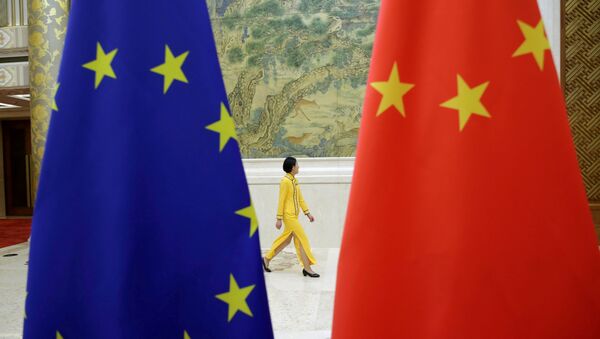The conclusion of negotiations between China and the European Union for a long-delayed investment deal has led to concerns among Indian diplomatic circles, as several former diplomats have pointed towards Brussels’ “dual approach” in dealing with Beijing.
“Despite branding China as a systemic rival, it is rather surprising that the EU is continuing with their economic partnership with Beijing unabashedly,” Gurjit Singh, India’s former Ambassador to Germany, told Sputnik.
Singh’s reference is to the new EU strategy on China, a March 2019 document which calls Beijing a “systematic rival” to Brussels.
He warns that EU’s close economic involvement with China could have a bearing on its strategic cooperation with India.
“We have been wooing the EU for a closer strategic partnership with us, particularly in the Indo-Pacific region. China, on the other hand, has successfully bound the EU in a deeper economic partnership,” states the former diplomat. Over the last year or so, EU powers such as France, the Netherlands, and Germany have presented their own Indo-Pacific outlooks.
“The Indo-Pacific approaches of EU powers are meant to expand their economic footprint in the region. Rivalry with China is not the central theme in their approaches, as in Washington’s,” he explains.
Singh also laments the fact that the EU has agreed to a new investment pact with Beijing even as it continues to “drag its feet” on a similar deal with India.
Negotiations for an India-EU Bilateral Investment Protection Agreement (BIPA) have stalled since 2013 due to concerns expressed by New Delhi over Brussels’ demands for greater market access for automobiles, farm products, wine, and spirits among other things. New Delhi, on the other hand, has been asking for easier work and study visa rules for its citizens in the EU, which it argues would make it easier for European companies to outsource their businesses to India.
On comparative terms, the EU was India’s largest trading partner in 2019, while also accounting for the highest foreign investment in the country.
However, India’s economic significance for the EU was less compared to China. While trade with China constituted nearly 13 percent of Brussels’ overall trade with the world, the corresponding figure for India was much lower at 2 percent.
“All we can do is keep pressing the EU for greater economic engagement with us, like they have done with China,” says Singh, noting the commitment towards a greater economic partnership between India and the EU in the joint statement after the 15th EU-India Summit in July this year.
‘Artificial Criticism’
“The in-principle approval for the new investment deal with China by the European leaders such as French President Emmanuel Macron and Germany’s Chancellor Angela Merkel just shows how artificial their criticism of Beijing over Hong Kong and the South China Sea issues has been,” he underlines.
The former Indian envoy also blasts the EU Commissioner Ursula von der Leyen for stating that the deal would anchor “our values-based trade agenda” with China, as he notes that concerns about the alleged use of Uighur “forced labour” in China remained unaddressed.
“The approval for the deal in the European capitals just shows how hypocritical the EU leaders have been in their oft-repeated claim to uphold human rights. They (EU) in a way are continuing with their traditional economic policy of cooperating closely with Beijing. Not only that, the EU appears to be consolidating its trade ties with China,” reckons the Indian diplomat.
Singh’s observations are in line with views expressed by many Indian social media users, who remember that German Chancellor Angela Merkel often touched on the role of “values” to differentiate the EU from China, and even with US President Donald Trump in the past.
All three criticisms valid. Why EU wants to give New Year gift to China? If concern is Biden will engage China and EU will be upstaged, then it is race for Chinese market which gives Xi upper hand. Merkel emphasised“values” in distancing from Trump. Xi’s values closer to hers!! https://t.co/9AyaoaLyzq
— Kanwal Sibal (@KanwalSibal) December 31, 2020
China and EU finalize bilateral trade deal!!
— Nishant Kumar (@nishkumar1977) December 30, 2020
There are no emotions when it comes to 💰💰💰




